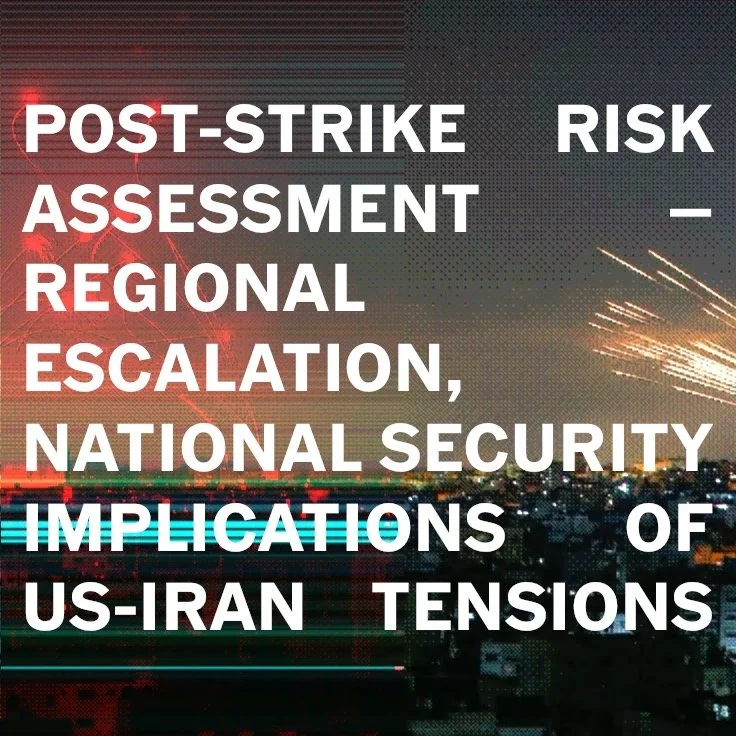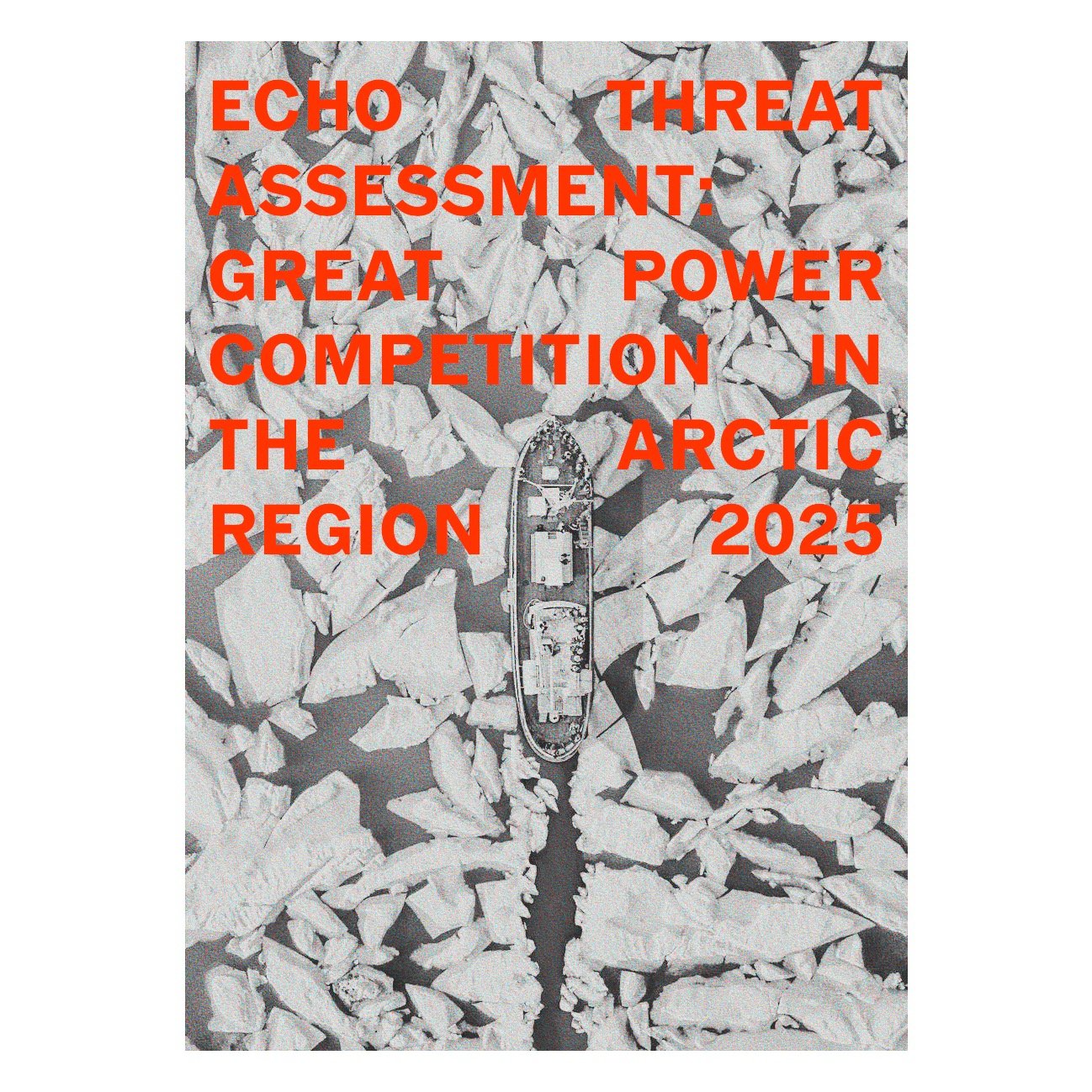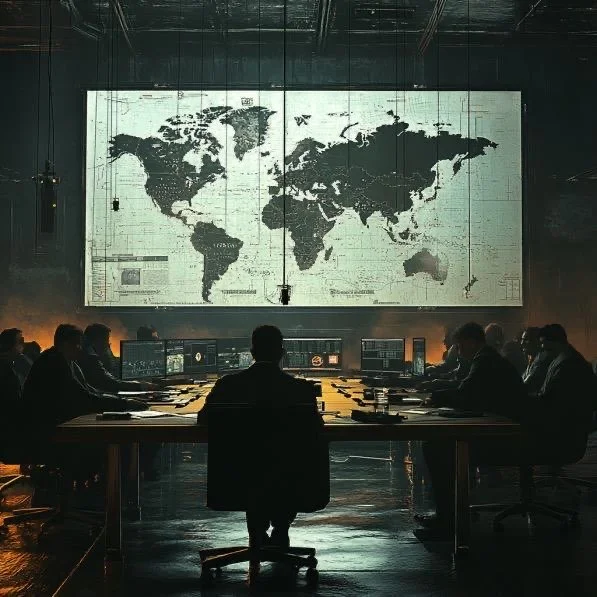
ECHO Risk Assessment: United States at Moderate Risk of Decline from Democratic Republic to Autocracy
ECHO assesses that the U.S. is at moderate risk of decline from a democratic republic to an autocracy, threatening constitutional integrity and national security. We base this assessment on publicly available news media reporting, academic research, non-partisan studies, and public statements and memoranda from the Executive Administration. This assessment is made with medium confidence.

Post-Strike Risk Assessment – Regional Escalation, National Security Implications of US-Iran Tensions
The recent US strikes on Iranian nuclear facilities have sharply escalated tensions in the Middle East, expanding a shadow conflict into open confrontation with the potential for global spillover. Immediate concerns include asymmetric retaliation by Iranian-aligned proxy forces, breakdowns in nuclear transparency, economic instability tied to Strait of Hormuz security, and growing pressure on Gulf states and transatlantic alliances. Critically, the threat landscape now extends to the US homeland, where Hezbollah, Hamas, the Houthis, and the PLF may respond with cyberattacks, lone-actor terrorism, and symbolic reprisals. While not all proxies possess the means for high-impact operations, the post-strike environment presents new opportunities for self-radicalized violence and digital disruption.

Alternative Futures Assessment of Israel–Iran Tensions, June Through December 2025
Tensions between Israel and Iran are entering a volatile and unpredictable phase, with a high risk of escalation in the coming six months. Iran's accelerated nuclear enrichment – approaching weapons-capable thresholds – and Israel's increasingly public posture about preemption have set the stage for potential conflict. Covert operations, cyber warfare, and regional proxy clashes have already intensified, while both nations signal a readiness to raise the stakes if red lines are crossed.

Elemental Warfare: Nation-State Competition for Rare Earth Minerals in Africa and Its Implication to US National Security
Global competition for rare earth minerals (REMs), essential to defense, energy, and technology, is driving geopolitical tension and instability, particularly in Africa. As China maintains dominance in the REM supply chain, the US, EU, and others are turning to African sources, where weak governance and fragile institutions create openings for exploitation. Russia, through private military firms/private military contractors (PMFs/PMCs) like the Wagner Group, is using security contracts to secure mining assets and expand influence, often fueling corruption and conflict. This militarized scramble for REMs risks deepening regional instability and violence as demand rises, especially with the global shift toward green technologies.

ECHO Threat Assessment: Great Power Competition in the Arctic Region 2025
ECHO evaluates the Arctic region as a critical flashpoint of great power competition among the U.S., China, and Russia over the next decade. This competition will be marked by increasing geopolitical tensions and military and economic developments crucial for each nation's domestic and foreign policy strategies.
ECHO summarizes the Arctic's importance through three strategic components: (i) access to essential natural resources, such as fossil fuels and rare earth elements; (ii) access to alternative commercial shipping routes between major international markets; and (iii) the geographic capability to deploy critical national defense assets, including early warning and nuclear launch detection facilities.

Electronic Spies Like Us: Threats and Benefits of Open Source Intelligence in 2025
OSINT is a vital tool across the US Intelligence Community (USIC), law enforcement, and private sector, enhancing situational awareness, cybersecurity, counterterrorism, and crisis response. Reports indicate that 80% of actionable intelligence in counterterrorism operations is sourced from OSINT, while its role in disaster response has improved emergency reaction times by 35%. However, adversarial states like Russia, China, and Iran increasingly exploit OSINT for cyber operations, espionage, and disinformation campaigns, with Russian-backed influence operations reaching tens of millions globally and Chinese economic espionage targeting over 200 Western firms in two years. Additionally, OSINT aids terrorist groups and cybercriminals in recruitment, planning, and misinformation. To mitigate these risks, intelligence agencies and businesses are integrating AI-driven validation methods, while governments are enforcing stricter policies and fostering public-private partnerships. A balanced approach that maximizes OSINT’s benefits while countering adversarial exploitation will be crucial to national security, corporate integrity, and global stability.

China, Russia, and Iran Very Likely to Leverage Recent USG Layoffs for Human Source Targeting, Threatening US National Security
ECHO assesses that the intelligence agencies of China, Russia, and Iran will very likely exploit recent cuts in U.S. federal agencies for targeting and recruiting purposes, posing a threat to U.S. national security. This assessment stems from the following factors: (i) publicly available reports documenting recent terminations within U.S. Government (USG) agencies by the Department of Government Efficiency (DOGE), (ii) current information from the U.S. Intelligence Community (USIC) regarding foreign adversaries' intentions and geopolitical goals, and (iii) recent cases involving U.S. persons (USPERs) convicted of espionage. ECHO makes this assessment with high confidence.
